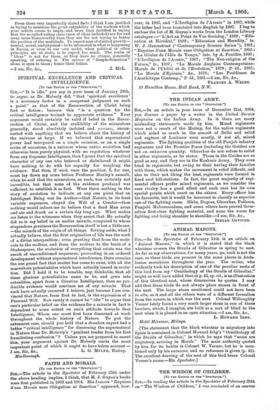SIR,—Would you kindly allow me, as a working mason who
subscribes to your weekly, to express an opinion or two arising out of the article under the above heading in your issue of February 18th P The economical argument of the authors of the Appeal is entirely fallacious, but their moral one is, as you say, very much to the point. At first sight, any one who thinks at all would not conclude that the extravagance of the rich is the cause of an ever-increasing pauperism ; and your truism that "two facts do not stand in the relation of cause and effect merely by being placed in juxtaposition" has in this respect been flagrantly violated by the authors of the Appeal. They have let their goodwill to the poor override their reason, and as this has been made very apparent in your article, further comment is quite unnecessary.
The point I wish to deal with specially is the depraved condi- tion of the workers. What you have said in the clearest language possible about the "mental condition of the multitude" is, alas! too true. But I wish you had gone a little further afield, and stated what you thought were the main contributing causes to this low state of mind in the people. It is not relevant to the subject, you may justly say ; but it is as one desirous of informa- tion that I speak, as one wishing "light and leading." And I hope that in the near future you will go more into details, and give us an article on "the real causes" of pauperism. In the meantime, however, I would like to say something in extenua- tion of this crime (if such a term can be applied) of the workers, —viz., "their being interested in sport only, and that passively."
Firstly, then, the children of the people are not well tended (according to enlightened opinion on matters of health, Sic., &c.) in early life, as the means are never forthcoming to enable their parents to provide the necessary (normal) food, clothing, and shelter.
Secondly, they are sent to school to receive an education which is not for them, because Educational Boards always prescribe a "code" of education for children whose creature comforts have been attended to.
And lastly, they are hurried off to work in the shop or factory at the tender age of thirteen or fourteen, just when history and grammar and the facts of science were becoming not so uninter- esting to them. What they hear, too, in the shop or factory is anything but edifying, as the bulk of the talk is about theatres, (low) music-halls, drinking bouts, women, and football,—only a reflex of training and environment. They have to start work early (6 a.m.), and they are at it until late ; and when they get home (P) they are tired,—too tired to be serious about anything. It is in the term of their apprenticeship that the little knowledge that was crammed into their " dulled ' brains at school is wiped out, and they become stupid as to ennobling ideas and ideals. When their apprenticeship is over their habits are generally formed, and their power to throw off any habit or habits has become less, not merely on account of a common mental build, but principally on account of the greater physical exhaustion they experience as journeymen, brought about through the excessive demands of their masters. Of course, I am aware that the market forces the hands of the masters a bit.
From these very imperfectly stated facts I think I am justified in trying to minimise the great culpability of the workers which your article seems to imply, and more than justified in saying that the so-called ruling class (men of ideas included) are far and away more blameworthy than they are for not trying to better the position of the multitude. To expect men of stunted growth— mental, moral, and physical—to be interested in what is happening in Russia, or even in our own midst, when political or other principles are at stake, is to expect too much. The realm of " Ideas " is not for them, as they have no chance, generally speaking, of entering it. The sphere of "Simple-Sensation" alone is open to them ; hence their follies.
—I am, Sir, &c., J. MDL.











































 Previous page
Previous page